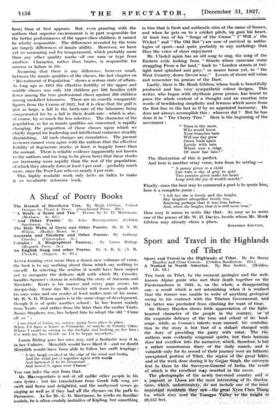A Sheaf of Poetry Books The Branch of Hawthorn Tree..
By Monk Gibbon. Colour - Designs by Picart le Deux. (Greyhound Press. ''.20s..) "A Score, a Score and Ten: Poems: by O. DI, Martineau.
- (Methuen. .4s. Od.) The Holy Wells of Orris and Other Poems.. By R. N. D.
Aucassin and Nicolette and Other Poems. By Anthony Crossley. (Christopher. 5s.) Voltaire : A Biographical Fantasy. By Laura Riding.
• (Hogarth Press. 5s.) An English Song and other Poems. By A. R. IL (A. R. (Ybsdell).. (Ingpen. 3s. 6d.) krtma turning over more than a dozen new volumes of verse, the best is:to say nothing about those which say nothing to oneself. In selecting the residue it would have been unjust not to recognize the delicate skill with which Mr. Crossley handles Spenser's stanza in retelling the story of Ancassin and
Nieolette. Keats is his master and every page avows his discipleship. Some day Mr. Crossley will learn to speak with his .own voice and one reader at least makes note of his name. Mr. R. N. D. Wilson again is in the same stage of development, though it is of quite another school ; he has learnt mainly from Yeats---and rather from the later than the earlier Yeats. James Stephens, too, has helped him to adapt the old "Come all .ye " I am tired of losing my money, going from place to place, When I'd have a. house in Connacht, or maybe in - County Clare, Where I could be sitting in the firelight and looking on her face ; For with toy love beside me I'd be happy anywhere."
. Laura Riding goes her own way, and a fantastic way it is, in her .Voitaire.. • ;Meredith would have liked it-,--and nO: doubt - MereAith would have been able to follOw.her swift leapings—: A dry lauWereaked at the edge of the windand broke, -. -1
And the wind put it together again with words • , And fastened it to its broomtail And loosed it again over France."
•
_ You can infer the rest from that. - .
Mr. Mavrogordato is not at all unlike other people hi his . own lyrics ; but his translations from Greek folk song aie swift and fierce and delightful, and the unrhymed verselkOT singing as well as if they had all the rhymes on the path to Parnassus. As for Mr. G. I). Martineau, be siorks on familiar models, he is often crudely imitative of Kitiling, but something in him that is fresh and authentic stirs at the name of Sussex, and when he -gets -on to a cricket pitch, rip goes his heart. At least two Of his " Songs' Of the Crease " (" Will o' the Wicket" and "The Old Bat") are sure of survival in antho- logies of sport—and .quite probably in any anthology that
likes the voice of sheer enjoyinent. • -
Mr. Ubsdell again has an -Old song to sing, the Song of the•Eastern- exile looking from "Streets where. carairaiis eoine
Straggling From a far land," back to "London streets at twi- light mud Splashed and grey," or nearer home yet, to "the West Country, down Devon way." Lovers Of rivers *111 value and remember his Praises of the Dart
Lastly, there is Mr. Monk Gibbon, -Whose book is beautifully produced and has very' sympathetie colour designs. This *liter, who began with rhythmic prose poems, has learnt fel press the whole content of a thought and an emotion into words of bewildering simplicity and fewness *hiCh Moire from the first line to the last as if by an appointed harmony. • He does not always accomplish-this ; whoever-did ? But he has done it in "The Cherry Tree." Here is the beginning of the
movement :
" Trees in the snow, Who would know Your branches bare Will one day grew Green buds again Lovely with rain Where now a ridge Of snow has lain ?"
The illustration of this is perfect.
And here is another stray verse, torn from its setting :---- " A penny given to a child Can turn a sky of grey to gold. Two pennies given make his heart Leap with the joy of wealth untold." .
Finally, since the best way to commend a poet is to quote him, here is a complete poem : " I tell her she is lovely and she laughs, Shy laughter altogether lovely too, Knowing perhaps that it was true before, • And, when she laughs, that it is still more true."
How easy it seems to write like dim. As easy as to write one of the poems of Mr. W. H. Davies, beside whom Mr. Monk Gibbon may already claim a place. STEPHEN GWYNN.


























 Previous page
Previous page